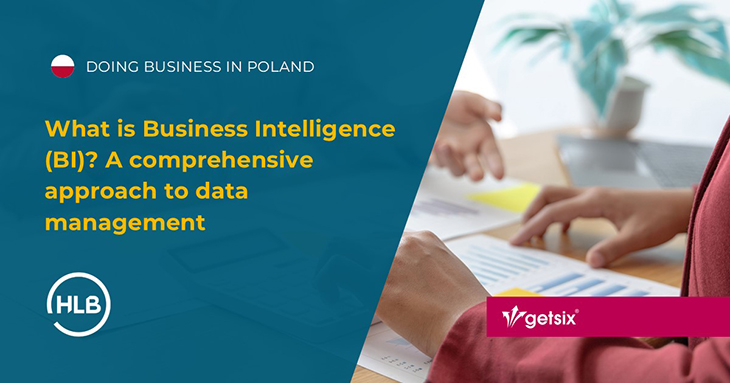What is Business Intelligence (BI)? A comprehensive approach to data management
Is your company harnessing the full potential of data in decision-making processes? Or perhaps you need better insights into market trends and key indicators? Business Intelligence (BI) may be the answer – a tool that revolutionizing the way businesses analyze and utilize data. In this article we take a look at the origins, definition, and applications of BI and suggest when and how to implement these systems in your organization.
The genesis of Business Intelligence
Business Intelligence (BI) is a term that emerged in 1958 in an article by Hans Peter Luhn, published in the IBM Journal. Luhn described BI as the ability to recognize patterns and relationships between data to make better business decisions.
His idea sparked the development of decision support systems (DSS), which began to be used in companies in the 1960s. In the beginning, these systems helped to analyse basic financial data and create reports.
In the 1980s, new technologies such as data warehouses and OLAP cubes (online analytical processing) emerged to process larger volumes of data. In 1989, analyst Howard Dresner proposed that the term BI should encompass all methods that help make decisions based on facts.
Today, Business Intelligence is much more than just data analysis. It’s a holistic process that involves collecting, processing, analyzing, and presenting data in a way that supports both strategic and operational decisions within organizations. Modern BI solutions, such as advanced analytical tools and data visualizations, allow companies to make faster, more accurate decisions that have a direct impact on their growth and competitiveness in the market.
What is Business Intelligence?
Business Intelligence is a set of tools, technologies, and processes that allow companies to collect, analyze, and interpret data. The goal of BI is to support business decision-making based on facts, rather than intuition. These systems enable raw data to be transformed into easy-to-read reports, dashboards and analyses, providing comprehensive insights into business performance.
Examples include BI platforms that bring together different data sources in one place, enabling the creation of dynamic reports and forecasts. These are key tools that help businesses not only analyze historical data but also predict future outcomes.
BI vs. traditional data collection
Traditional data collection methods involve gathering and storing information that is analyzed manually or in a limited scope. BI differs in that:
- Automates data analysis processes, eliminating the need for manual processing.
- Creates predictive models, allowing businesses to forecast future trends.
- Offers data visualization in the form of interactive dashboards, making interpretation significantly easier.
Benefits of implementing BI
Implementing BI systems brings a number of benefits to businesses:
- Better business decisions: access to real-time data enables rapid response to changing market conditions.
- Increased efficiency: automating data analysis relieves the IT department and enables more autonomy for business users.
- Cost optimization: BI helps identify areas for improvement and cost reduction.
- Better customer understanding: analyzing customer data allows to create more effective marketing strategies and improve service quality.
- Risk management: identifying risks and forecasting future performance reduces the risk of loss.
getsix® Services offers Power BI solutions that automate reporting and data analysis, supporting businesses in making better decisions. By integrating multiple data sources, such as Microsoft Dynamics 365 Business Central, Excel, and SQL Server, along with advanced security features, Power BI provides complete control over data and its security. Automatic report refresh and multidimensional analysis allow you to effectively manage every transaction in your business in real time: Make an appointment for a free consultation with our expert.
Who are BI solutions for?
BI systems are flexible and can be adapted to different sectors, including:
- E-commerce: analyzing sales performance, margins, and conversion rates.
- Manufacturing: process optimizing and inventory management.
- Finance: monitoring financial performance and risk management.
- Telecommunications and healthcare: operational analysis and trend forecasting.
These solutions are suitable for both large corporations and small businesses that want to make data-driven decisions.
Implementing BI – how and when?
Consider implementing BI when your company:
- Processes large amounts of data and requires automated analysis.
- Frequently generates reports and summaries.
- Is looking for ways to improve efficiency and reduce costs.
Implementation process:
- Needs analysis: defining business objectives and key performance indicators (KPIs).
- Choice of platform: tailoring the tool to the specifics of the company.
- Data integration: combining data from various systems and structuring it.
- Creating analytical models: preparing dashboards and reports.
- Training the team: ensuring the team has the necessary skills to use BI tools.
Modern BI systems can be implemented within a few weeks, making it possible for even smaller companies to benefit from their advantages.
Summary
Does your business make data-driven decisions or is it more about intuition? With Business Intelligence, you can gain an advantage that is hard to overestimate. Imagine dynamic reports, sales forecasts, or the ability to identify risks in real time – these are just a few of the benefits BI offers. Whether you run a small e-commerce business or a large corporation, modern BI solutions can improve every aspect of your business, from managing costs to better understanding your customers. Are you ready for a data-driven transformation?

The company getsix® Services has been an integral part of the getsix® Group for nearly 20 years, enabling them to provide tested and refined solutions for clients in the service industry who require efficient accounting and financial controlling solutions.
If you have any questions regarding this topic or if you are in need for any additional information – please do not hesitate to contact us:
CUSTOMER RELATIONSHIPS DEPARTMENT

ELŻBIETA
NARON-GROCHALSKA
Head of Customer Relationships
Department / Senior Manager
getsix® Group
***














